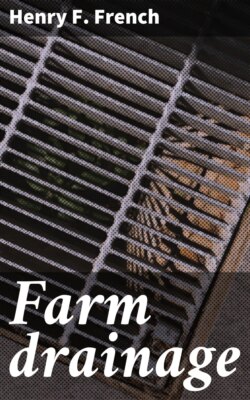Читать книгу Farm drainage - Henry F. French - Страница 10
На сайте Литреса книга снята с продажи.
DRAINAGE OF SPRINGS.
ОглавлениеTable of Contents
Fig. 3.
Wherever, from any cause, water bursts out from a hill's side, or from below, in a well defined spring, in any considerable quantity, the Elkington method of cutting a deep drain directly into the seat of the evil, and so lowering the water that it may be carried away below the surface, is obviously the true and common-sense remedy. There may be cases where, in addition to the drain, it may be expedient to bore with an auger in the course of the drain. This, however, would be useful only where, from the peculiar formation, water is pent up upon a retentive subsoil in the manner already indicated. Elkington's method of draining by boring is illustrated in the following cut.
In studying the history of Elkington's discovery, and especially of his own application of it, it would seem that he must have possessed some peculiar faculty of ascertaining the subterranean currents of water, not possessed or even claimed by modern engineers.
Indeed, Mr. Denton, who may rightly claim as much skill as a draining engineer, perhaps, as any man in England, expressly says, "It does not appear that any person now will undertake to do what Elkington did sixty years back."
In the Patent Office Report for 1851, at page 14, may be found an article entitled, "Well-digging," in which it is gravely contended, and not without a fair show of evidence, that certain persons possess the power of indicating, by means of a sort of divining rod of hazel or willow, subterraneous currents or springs of water. This power has been called Bletonism, which is defined by Webster to be, "the faculty of perceiving and indicating subterraneous springs and currents by sensation—so called from one Bleton, of France, who possessed this faculty."
Under the authority of Webster, and of Mr. Ewbank, the Commissioner of Patents, in whose report the article in question was published by the Government of the United States, it will not be considered, perhaps, as putting faith in "water-witchery," to suggest that, possibly, Elkington did really possess a faculty, not common to all mankind, of detecting running water or springs, even far below the surface. We have the high authority of Tam o' Shanter for the opinion, that witches cannot cross a stream of water; for, when pursued by the "hellish legion" from Kirk-Alloway, he put his "gude mare Meg" to do her "speedy utmost" for the bridge of Doon, knowing that,
"A running stream they darena cross."
If witches are thus affected by flowing water, there is no reason to doubt that others, of peculiar organization, may possess some sensitiveness at its presence.
It would not, probably, be useful to pursue more into detail the method of Mr. Elkington. The general principles upon which he wrought have been sufficiently explained. The miracles performed under his system seem to have ceased with his life, and, until we receive some new revelation as to the mode of finding the springs hidden in the earth, we must be content with the moderate results of a careful application of ordinary science, and not be discouraged in our attempts to leave the earth the better for our having lived on it, if we do not, like Elkington, succeed in draining, by a single ditch and a few auger holes, sixty statute acres of land.
